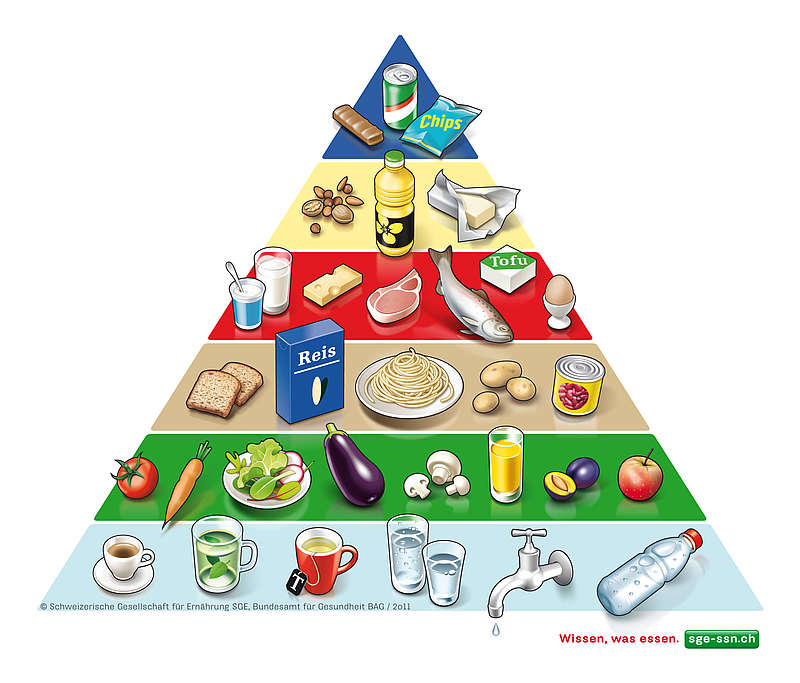For many of us, the day cannot begin without the familiar, comforting aroma of coffee. The cherished beverage, in its countless avatars, has become an integral part of our daily routines and social rituals. But as you savor the rich flavors of your morning brew, have you ever pondered over what food group coffee is in? Understanding where this beloved drink fits into the dietary landscape can help us appreciate not just its taste but its nutritional potential as well.
Navigating the world of nutrition can be complex, with a dizzying array of food groups and classifications. Coffee, despite its ubiquity, often gets overlooked in these classifications. Where does it slot into our dietary guidelines? Is it a grain, because it comes from a plant seed? Is it a fruit, as the coffee ‘bean’ is technically the pit of a cherry-like berry? Or does it align more closely with beverages, an entity on its own?
The team at The Coffee Guru has set out to demystify the food pyramid placement of coffee. Our journey will take us through the world of coffee – from its botanical origins and nutritional profile to its health implications and cultural significance. As we delve deeper, we’ll not only uncover coffee’s place in the food group hierarchy but also explore the intricate dance of taste, health, and tradition that coffee so eloquently embodies.
So, grab a cup of your favorite coffee, and join us as we embark on this intriguing exploration into the world of coffee and its position within the grand scheme of dietary guidelines. It’s time to unravel the story behind every sip.
What Food Group Is Coffee In? – Key Takeaway
- The ‘Other Calories’ Category: According to the USDA, coffee is categorized under ‘calories for other uses,’ a group reserved for food items with low nutrient concentrations such as fizzy drinks and alcoholic beverages. This category offers individuals a calorie budget as part of their balanced diet, reinforcing the need for moderation in coffee consumption.
- Coffee Chemistry: Coffee is a complex blend of hundreds of chemical compounds, including caffeine, chlorogenic acids, diterpenes, and melanoidins, which contribute to its taste, aroma, and color.
- Health Influence: The consumption of coffee can positively impact health, from boosting metabolism and brain function to potentially reducing risks for certain chronic diseases, provided it is consumed in moderation.
- Cultural Coffee: Coffee holds significant cultural and social weight, with its own unique traditions, rituals, and significance in global cuisine and as a social conduit across various cultures.
- The Third Wave Impact: The rising trend of third-wave coffee, treating coffee as an artisanal foodstuff, has brought an emphasis on quality, sustainability, and a deep understanding of coffee production, shaping modern coffee consumption trends.
The Origins and Composition of Coffee
Coffee, one of the most universally consumed beverages, has a rich and complex origin story. The journey from bean to brew is marked by a multitude of steps, each adding to the distinct taste, aroma, and composition that we have come to love. Understanding the origins and composition of coffee can enhance our appreciation for every cup.
From Bean to Brew: Understanding Coffee Production

The coffee we enjoy begins its journey on plantations primarily located in the tropical belt around the globe. The process of coffee production is both intricate and fascinating. It all starts with planting the coffee cherries, which are carefully nurtured until they ripen to a vibrant red. Once harvested, the cherries undergo either a dry or wet method of processing to extract the green coffee beans. (1)
After drying, the beans are roasted at specific temperatures, a process that brings out the flavors we associate with coffee. The roasting duration can vary from light to dark roasts, each producing unique taste profiles. Finally, the roasted beans are ground and brewed to create the coffee that lands in our cups.
- Planting & Harvesting: Coffee cherries are grown, harvested, and processed to extract green beans.
- Roasting: The beans are roasted at varying degrees, determining the flavor and strength of the final product.
- Grinding & Brewing: The roasted beans are ground and brewed to make coffee.
The Chemistry of Coffee: What’s in Your Cup?

Coffee is more than just hot water and ground beans; it’s a complex concoction of hundreds of chemical compounds. These compounds contribute to the taste, aroma, and color of the beverage. The key constituents include caffeine (the psychoactive stimulant), chlorogenic acids (the primary antioxidants), diterpenes (compounds that influence cholesterol levels), and melanoidins (which contribute to the color and antioxidant activity).
- Caffeine: The primary psychoactive ingredient in coffee that contributes to its stimulating effects.
- Chlorogenic Acids: These are powerful antioxidants found in coffee.
- Diterpenes: These compounds may affect cholesterol levels.
- Melanoidins: These contribute to coffee’s color and antioxidant properties.
Coffee Varieties: Arabica, Robusta, and Beyond

While there are over a hundred species of coffee, the two most commercially significant varieties are Coffea arabica (Arabica) and Coffea canephora (Robusta). Arabica, known for its smooth, mild flavor and lower caffeine content, accounts for about 60% of global coffee production. Robusta, on the other hand, is more robust in flavor, higher in caffeine, and easier to cultivate, making it a popular choice for instant coffee and espresso blends. Other less common types include Liberica and Excelsa, each with their unique taste profiles.
- Arabica: Known for its smooth, mild flavor and lower caffeine content.
- Robusta: Has a stronger flavor, higher caffeine content, and is used primarily in espresso and instant coffee.
- Less Common Varieties: Liberica and Excelsa coffee offer unique flavor profiles but are not as widely produced or consumed.
Understanding the origins, composition, and varieties of coffee provides us with a comprehensive view of the complexity that underlies this popular beverage. It’s not just a drink—it’s a testament to the rich tapestry of cultivation, chemistry, and taste that makes every cup an experience.
Coffee in the Pyramid of Food Groups

One of the burning questions that coffee enthusiasts often grapple with is: What Food Group Is Coffee In? Does it fit into the pyramid of food groups that nutritionists use as a blueprint for balanced diets? While coffee is not traditionally placed within a specific food group like fruits, vegetables, or grains, it does play a role in our dietary habits. Let’s explore coffee’s position in dietary guidelines and its interaction with carbohydrates and fats.
Identifying Coffee’s Place in Dietary Food Guidelines
When we look at dietary guidelines and the food pyramid, coffee does not slot neatly into one of the standard food groups. Instead, it is often categorized with “calories for other uses“, outside of the primary food group sectors. These guidelines commonly advise moderate consumption due to its caffeine content and potential impact on sleep and overall health.

However, it’s also important to note that coffee, specifically black coffee, can contribute to our daily intake of certain nutrients like potassium, magnesium, and B vitamins. Moreover, as an abundant source of antioxidants, it plays a supporting role in fighting oxidative stress and inflammation.
- Coffee’s Category: Coffee is often grouped with “calories for other uses” in dietary guidelines.
- Moderate Consumption: Because of its caffeine content and potential health impacts, moderate consumption is typically recommended.
- Nutrient Contribution: Despite not fitting into a specific food group, coffee contributes to our intake of certain nutrients and antioxidants.
Coffee and Carbohydrates: The Role of Sugars and Sweeteners
In its purest form, black coffee is virtually carb-free. However, the carbohydrate content can spike with the addition of sugars or sweeteners. This can transform coffee from a virtually carb-free drink into a significant source of sugars, impacting blood sugar levels, and overall caloric intake. It’s crucial to be mindful of these additions, especially if you are managing conditions like diabetes or following a low-carb diet.
- Black Coffee: Virtually carb-free.
- Coffee with Sugars or Sweeteners: The carbohydrate content can increase significantly with these additions, impacting blood sugar levels and caloric intake.
Coffee and Fats: Milk, Cream, and Plant-Based Alternatives
While black coffee is virtually fat-free, adding milk, cream, or plant-based milk alternatives can alter its nutritional profile, particularly its fat content. Full-fat dairy milk or cream can add a significant amount of saturated fat. On the other hand, plant-based alternatives like almond milk or oat milk can contribute healthy monounsaturated and polyunsaturated fats, although the amounts can vary based on the brand and formulation.
Understanding the impact of these additions on the fat content of your coffee is important for managing your daily fat intake, particularly if you are mindful of your heart health or following a specific dietary plan.
- Black Coffee: It is virtually fat-free.
- Coffee with Dairy or Plant-Based Additions: These additions can increase the fat content of coffee, with the type and amount of fat varying based on the choice of milk or cream.
While coffee may not fit neatly into a specific food group, it’s clear that it plays a significant role in our daily nutrition intake. By understanding its nutritional profile and the impact of common additions, we can make informed decisions to tailor our coffee habits to suit our dietary needs and preferences.
Coffee and its Food Group Affiliation:

As mentioned, coffee is grouped as “calories for other uses”, not finding its place in any of the USDA’s key food divisions, encompassing dairy, vegetables, fruits, grains, proteins, and fats and oils.
It shares its grouping with other foodstuffs of low nutrient concentration (e.g. fizzy drinks, alcoholic beverages, and so on) within a singular compartment by the USDA. This compartment affords individuals a calorie budget for their consumption as part of a balanced dietary routine.
Coffee, in its pure form, contains minimal calories but is rich in certain nutrients like potassium, magnesium, and B vitamins. Moreover, it stands as one of the significant sources of antioxidants in many people’s diets. However, it’s important to remember that these nutritional benefits primarily apply to black coffee. Additional ingredients, like sugar, cream, or flavorings, can significantly alter its nutritional profile and its position in the dietary landscape.
- Nutritional Contributions: Despite being a beverage, coffee can contribute to our daily intake of certain nutrients and antioxidants.
- Effect of Additions: Additional ingredients can alter coffee’s nutritional profile, and thereby, its impact on our diet.
Balancing Coffee Intake: The Role of Moderation

The often-repeated adage, “everything in moderation,” holds true for coffee consumption. While coffee offers several potential health benefits, ranging from a source of essential nutrients to a provider of antioxidants, overconsumption can lead to unwanted effects. This is primarily due to its caffeine content, which can cause sleep disturbances, anxiety, and even increased heart rate when consumed excessively.
The Dietary Guidelines for Americans suggests a limit of up to 400 milligrams of caffeine per day for most adults, equivalent to about three to four 8-ounce cups of coffee. However, individual tolerance to caffeine can vary, and some people may need to consume less to avoid side effects. Furthermore, pregnant individuals, those with specific health conditions, and individuals sensitive to caffeine may need to limit their intake further.
- Moderation is Key: While coffee offers several potential health benefits, overconsumption can lead to unwanted effects.
- Caffeine Limits: The Dietary Guidelines suggest a limit of up to 400 milligrams of caffeine per day for most adults, but individual needs may vary.
Balancing coffee intake involves understanding its potential benefits and pitfalls. By consuming coffee in moderation and being mindful of added ingredients, you can enjoy the rich flavors and potential health benefits of this beloved beverage, without overstepping your dietary goals.
The Nutrition Facts and Health Benefits of Coffee
As a commonly consumed beverage globally, coffee’s impact on our overall dietary intake warrants examination. It’s not just about the buzz of caffeine; coffee’s nutritional profile extends beyond this common stimulant. From the calorie count of different variations to the potential health benefits of coffee and antioxidants, this section dives into the often overlooked nutrition facts of coffee.
Decoding the Nutritional Profile of Black Coffee

Black coffee, served without milk or sugar, provides more than just a bitter, robust flavor. It’s a low-calorie beverage rich in essential nutrients. A typical 8-ounce (240-milliliter) cup of black coffee contains negligible amounts of fat, cholesterol, sodium, and sugar. However, it serves as a source of potassium and magnesium and houses trace amounts of calcium and iron.
Moreover, it’s abundant in riboflavin (vitamin B2), niacin (vitamin B3), and pantothenic acid (vitamin B5) – vital B vitamins involved in energy production and other bodily functions. However, the exact nutritional value can vary based on factors such as the type of coffee bean, the roasting process, and the brewing method.
- Calorie and Macronutrient Profile: An 8-ounce serving of black coffee typically contains 2 calories and negligible amounts of fat, cholesterol, sodium, and sugars.
- Vitamin and Mineral Profile: Black coffee provides potassium and magnesium and contains trace amounts of calcium and iron. It’s also a source of vitamins B2, B3, and B5.
Understanding the Calories in Coffee: Does Coffee Count?
When consumed in its purest form – black and unsweetened – coffee’s contribution to your daily calorie intake is almost insignificant. However, as discussed, the caloric content can escalate quickly with the addition of milk, cream, sugar, or flavored syrups. For instance, a latte or a cappuccino made with whole milk can contain between 100 to 150 calories. On the other hand, specialty coffee drinks like mochas or frappuccinos can pack several hundred calories due to added sugars and fat.
While these additions may enhance the taste, they also transform coffee from a virtually calorie-free beverage to one that can impact your daily caloric intake. Therefore, being mindful of what goes into your coffee is important, especially if you are watching your weight or managing specific dietary needs.
- Black Coffee: An 8-ounce serving of black coffee contains approximately 2 calories.
- Coffee with Additions: The calorie content can increase significantly with additions like milk, cream, sugar, or flavored syrups.
Coffee and Antioxidants: A Hidden Health Benefit?
When thinking about antioxidant-rich foods, coffee might not be the first thing that springs to mind. However, coffee is a rich source of antioxidants, compounds that help protect the body against damage from harmful molecules called free radicals. Coffee’s antioxidant content comes primarily from chlorogenic acid but also includes other antioxidants like caffeic acid, melanoidins, and even caffeine itself.
Interestingly, because of the volume of coffee consumed in some diets, it often serves as one of the primary sources of antioxidants. Several studies have shown potential health benefits linked to these antioxidants, such as reducing inflammation, protecting heart health, and even lowering the risk of certain types of cancer.
- Antioxidants in Coffee: The primary antioxidants in coffee include chlorogenic acid, caffeic acid, and melanoidins.
- Health Benefits: Antioxidants in coffee may help reduce inflammation, protect heart health, and lower the risk of certain cancers.
As we delve into the nutrition facts of coffee, we see that it’s more than just a morning ritual or an afternoon pick-me-up. The nutritional profile of coffee, especially its antioxidant content, highlights its potential role in a balanced, healthy diet.
Chronic Diseases: Potential Risk Reduction

Coffee consumption has been linked to the potential reduction of risk for several chronic diseases. A wealth of research suggests that moderate coffee intake may be associated with a decreased risk of conditions such as type 2 diabetes, Parkinson’s disease, and certain types of cancer. (2)
A number of studies suggest that the antioxidants and anti-inflammatory compounds in coffee could play a protective role. They may help to reduce oxidative stress and inflammation, which are common pathways for many chronic diseases. However, it’s essential to note that more research is needed to fully understand these relationships, and coffee should not be considered a cure or preventative measure for these conditions on its own.
- Reduced Risk of Chronic Diseases: Moderate coffee consumption may be associated with a decreased risk of conditions such as type 2 diabetes, Parkinson’s disease, and certain cancers.
- Role of Antioxidants and Anti-Inflammatory Compounds: These components in coffee may help reduce oxidative stress and inflammation, common pathways for many chronic diseases.
- More Research Needed: While these associations are promising, more research is needed, and coffee should not be relied upon as a cure or preventative measure on its own.
Metabolic Health: Effects on Insulin Sensitivity
Coffee’s effects on metabolic health, particularly its impact on insulin sensitivity, is an area of ongoing research. Some studies suggest that moderate coffee consumption might improve insulin sensitivity, thereby potentially reducing the risk of type 2 diabetes. The proposed mechanism is related to the antioxidants in coffee, which may help the body use insulin more effectively and prevent tissue damage.
However, it’s important to underscore that these effects can vary based on individual factors, and the overall dietary pattern plays a significant role in metabolic health. The inclusion of sugary additives or high-fat dairy products in coffee, for instance, can counteract these potential benefits by increasing calorie intake and potentially leading to weight gain and reduced insulin sensitivity.
- Potential Improvement in Insulin Sensitivity: Some studies suggest that moderate coffee consumption might improve insulin sensitivity, potentially reducing the risk of type 2 diabetes.
- Role of Antioxidants: The antioxidants in coffee may help the body use insulin more effectively and prevent tissue damage.
- Importance of Overall Diet: The potential benefits on insulin sensitivity can be influenced by overall dietary patterns and individual factors.
While coffee may offer potential benefits in terms of reducing the risk of chronic diseases and influencing metabolic health, it’s critical to consume it as part of a balanced diet. Additionally, factors such as genetic predisposition, lifestyle choices, and other dietary habits are essential considerations in the context of chronic disease risk and metabolic health.
Coffee Consumption and Brain Health: A Complex Relationship

Coffee consumption has been associated with various effects on brain health. Its primary active ingredient, caffeine, is a stimulant that can enhance brain function in the short term by blocking adenosine receptors, leading to increased alertness and reduced fatigue.
Long-term, moderate coffee consumption has been associated with a lower risk of neurological diseases such as Parkinson’s and Alzheimer’s. However, it’s important to note that these findings are observational, and more research is needed to establish a clear cause-effect relationship. (3)
- Caffeine and Brain Function: Caffeine, a primary active ingredient in coffee, can enhance short-term brain function by increasing alertness and reducing fatigue.
- Neurological Diseases: Moderate coffee consumption has been associated with a lower risk of neurological diseases such as Parkinson’s and Alzheimer’s, although more research is needed.
The Impact of Coffee on Metabolism and Weight Loss

Coffee’s impact on metabolism and weight loss is an area of ongoing research. Certain components in coffee, especially caffeine, have been found to stimulate thermogenesis – the process by which your body generates heat and energy from digesting food. This can potentially increase your metabolic rate and aid in weight loss.
However, it’s crucial to keep in mind that coffee is not a magic bullet for weight loss. While it may assist with energy expenditure, true weight loss is often achieved through a combination of a balanced diet, regular physical activity, and a healthy lifestyle. Moreover, adding calorie-dense additives like sugar and cream to coffee can significantly impact its calorie content and negate potential weight loss benefits.
- Thermogenesis: Coffee, especially due to its caffeine content, can stimulate thermogenesis, potentially increasing the metabolic rate and aiding in weight loss.
- No Magic Bullet: Coffee is not a miracle weight loss solution. True weight loss is usually achieved through a balanced diet, regular physical activity, and a healthy lifestyle.
- Watch the Additives: Adding calorie-dense ingredients like sugar and cream to coffee can significantly impact its calorie content, potentially negating any weight loss benefits.
Health Implications of Coffee Consumption
While coffee consumption can bring potential health benefits, it’s crucial to recognize its potential health implications. Let’s delve into the individual differences in caffeine sensitivity, the impact of coffee on sleep, and its relationship with cardiovascular health.
Caffeine Sensitivity and Individual Differences
Caffeine sensitivity refers to the amount of caffeine that will produce an effect in a person. This sensitivity varies widely among individuals due to factors such as genetics, age, body mass, and tolerance developed from habitual consumption.

Some people can consume several cups of coffee without any ill effects, while others may experience jitters, increased heart rate, or gastrointestinal upset after just one cup. It’s essential to listen to your body and adjust your coffee intake accordingly, considering any advice from healthcare professionals if you have specific health conditions that may be influenced by caffeine.
- Caffeine Sensitivity: This term refers to the amount of caffeine that will produce an effect in a person, which varies among individuals.
- Individual Differences: Factors such as genetics, age, body mass, and habitual consumption can affect caffeine sensitivity.
- Listening to Your Body: It’s crucial to monitor your body’s reactions to caffeine and adjust your intake accordingly.
Coffee and Sleep Disruption: Finding the Right Balance
Coffee can be a double-edged sword when it comes to sleep. On one hand, the caffeine in coffee can help ward off sleepiness and enhance focus and alertness. On the other hand, consuming coffee late in the day can interfere with the sleep cycle, leading to difficulty falling asleep or disrupted sleep patterns.

Experts generally recommend limiting coffee consumption in the hours leading up to bedtime. However, the exact timing can depend on individual differences in how quickly your body metabolizes caffeine. A good rule of thumb is to avoid coffee for at least six hours before going to bed.
- Effects on Sleep: Coffee can both ward off sleepiness and interfere with the sleep cycle, depending on the timing of consumption.
- Limiting Coffee Before Bed: Experts generally recommend avoiding coffee for at least six hours before bedtime, but individual needs may vary.
Coffee and Cardiovascular Health: Uncovering the Truth
The relationship between coffee and cardiovascular health has been a hot topic of research. While early studies suggested a potential increase in heart disease risk with high coffee consumption, more recent research has not found a significant association between moderate coffee consumption and increased cardiovascular risk. In fact, some research even suggests that moderate coffee intake could potentially have a protective effect.

However, it’s crucial to understand that these findings don’t give a green light to limitless coffee consumption. Factors like the addition of high-fat dairy products or sugar, individual genetic predispositions, and overall diet and lifestyle can significantly impact cardiovascular health.
- Current Research: More recent studies have not found a significant association between moderate coffee consumption and increased cardiovascular risk, with some suggesting a potential protective effect.
- Moderation and Consideration: Even with these findings, moderation in coffee consumption is crucial, and individual factors, dietary habits, and lifestyle choices should be taken into account.
In essence, while coffee can have positive effects on our health, it’s critical to consider individual differences and potential implications on sleep and cardiovascular health. Understanding these aspects can help us make more informed decisions about our coffee consumption.
Coffee and Dehydration: Debunking the Myth
A common myth is that coffee, due to its caffeine content, can lead to dehydration. While caffeine does have a mild diuretic effect, causing the kidneys to flush extra sodium and water from the body, the water content in coffee typically compensates for this effect. Consequently, moderate coffee consumption doesn’t necessarily cause dehydration.
However, relying solely on coffee for hydration isn’t advisable. It’s important to consume a variety of fluids, including water, to meet your hydration needs effectively.
- Caffeine and Diuresis: While caffeine does have a mild diuretic effect, the water content in coffee usually compensates for this, meaning moderate coffee consumption doesn’t necessarily cause dehydration.
- Variety in Hydration: It’s essential to consume a variety of fluids, including water, for effective hydration.
By understanding these facets of coffee’s influence on metabolism, brain health, and hydration, we can make informed decisions that ensure our coffee consumption aligns with our overall health and well-being goals.
The Coffee Food Group Conclusion
In unraveling the question, “What Food Group Is Coffee In?”, we have journeyed through a myriad of fascinating insights about this beloved beverage. Its position in the food pyramid aligns most closely with the ‘calories for other uses’ group, with its nutritional value largely resting in its antioxidant content and low-calorie profile when consumed black or with minimal additives. However, the story of coffee does not end at its nutritional composition.
From its intricate journey from bean to brew, its complex chemical make-up, to its impact on our metabolism, brain health, and even weight loss, coffee’s influence is multi-faceted. Its role in reducing the risk of certain chronic diseases, the importance of moderating intake, and the potential impacts on sleep and hydration all contribute to a broad understanding of this universal drink.
Equally compelling is coffee’s social and cultural role, as it features prominently in global cuisine and has evolved rich, diverse traditions around the world. From the conventional to the avant-garde, coffee culture continues to innovate, as evident in the rising trend of third-wave coffee.
The narrative of coffee is a blend of science, culture, and personal experience. Understanding its place in our diet and culture allows us to appreciate not just the taste but the journey and impact of each cup we enjoy. As we continue to learn and adapt, the team at The Coffee Guru invites you to join us in deepening our collective knowledge, appreciation, and responsible enjoyment of this extraordinary beverage.
FAQ
What are the nutritional components of coffee?
Coffee contains essential nutrients like B vitamins, manganese, and potassium, as well as a high level of antioxidants.
Does coffee fit into any specific food group in the food pyramid?
Coffee is not included in any of the USDA’s major food groups, including dairy products, fruits, grains, vegetables, proteins, or fats and oils. Instead, it's categorized in the 'calories for other uses' group.
How does coffee align with the current dietary guidelines?
Moderation is key when it comes to coffee, aligning with dietary guidelines that recommend limiting the intake of caffeine and added sugars.
How can coffee intake influence your health?
Coffee can influence health in various ways, from improving metabolism and brain function to potentially reducing risks for certain chronic diseases.
What role does coffee play in different cultures?
Coffee plays a significant role in various cultures, featuring in traditions, rituals, global cuisine, and as a social conduit.
What is third wave coffee and how does it impact coffee consumption trends?
Third-wave coffee, which treats coffee as an artisanal foodstuff, has impacted consumption trends by emphasizing quality, sustainability, and a deep understanding of coffee production.













